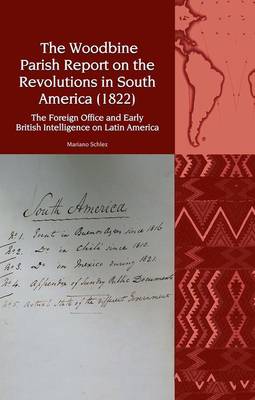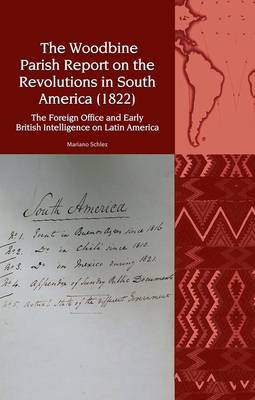
Bedankt voor het vertrouwen het afgelopen jaar! Om jou te bedanken bieden we GRATIS verzending (in België) aan op alles gedurende de hele maand januari.
- Afhalen na 1 uur in een winkel met voorraad
- In januari gratis thuislevering in België
- Ruim aanbod met 7 miljoen producten
Bedankt voor het vertrouwen het afgelopen jaar! Om jou te bedanken bieden we GRATIS verzending (in België) aan op alles gedurende de hele maand januari.
- Afhalen na 1 uur in een winkel met voorraad
- In januari gratis thuislevering in België
- Ruim aanbod met 7 miljoen producten
Zoeken
The Woodbine Parish Report on the Revolutions in South America (1822)
The Foreign Office and Early British Intelligence on Latin America
Mariano Martín Schlez
€ 237,45
+ 474 punten
Omschrijving
This book presents the unpublished intelligence report "South America", written in 1822 by Woodbine Parish, clerk at the Foreign Office, Castlereagh's private secretary and later the first British Consul to Buenos Aires. The document is transcribed, analysed and fully contextualised in order to foreground its decisive historical significance. The aim of Parish's report was to outline British foreign policy and political strategy towards the South American revolutions at the final Congress of the Holy Alliance, held in Verona. Its publication contributes to the ongoing debates on Informal Empire, providing new empirical evidence that will enable us to better understand the social content of the political, economic and cultural relationships established between Britain and Latin America in the first half of the 19th century. The history of the document and of its author introduce the reader to the early stages of British intelligence and diplomacy with respect to an Independent Latin America, revealing the Foreign Office's powers and limitations. Likewise, they offer an overview of the information about the South American revolutions circulating in London at the time, as well as the mechanisms used by the British government to obtain, classify and publicize this intelligence for political purposes. In this sense, the report makes evident the importance for the British government of knowing a specific historical and geographical reality in order to develop a foreign policy and political strategy. The book reflects on how this knowledge was mediated by class antagonisms and social relations (on a national and international scale) and was shaped by the stages of development of the productive forces in the regions involved. In this sense, studying the Parish family will allow us to more fully understand the role played by the increasingly influential social classes, in particular the merchants and manufacturers, in the development and implementation of a British foreign policy for Latin America.
Specificaties
Betrokkenen
- Auteur(s):
- Uitgeverij:
Inhoud
- Aantal bladzijden:
- 296
- Taal:
- Engels
- Reeks:
- Reeksnummer:
- nr. 27
Eigenschappen
- Productcode (EAN):
- 9781802077315
- Verschijningsdatum:
- 1/01/2023
- Uitvoering:
- Hardcover
- Formaat:
- Genaaid
- Afmetingen:
- 156 mm x 234 mm
- Gewicht:
- 589 g

Alleen bij Standaard Boekhandel
+ 474 punten op je klantenkaart van Standaard Boekhandel
Beoordelingen
We publiceren alleen reviews die voldoen aan de voorwaarden voor reviews. Bekijk onze voorwaarden voor reviews.









